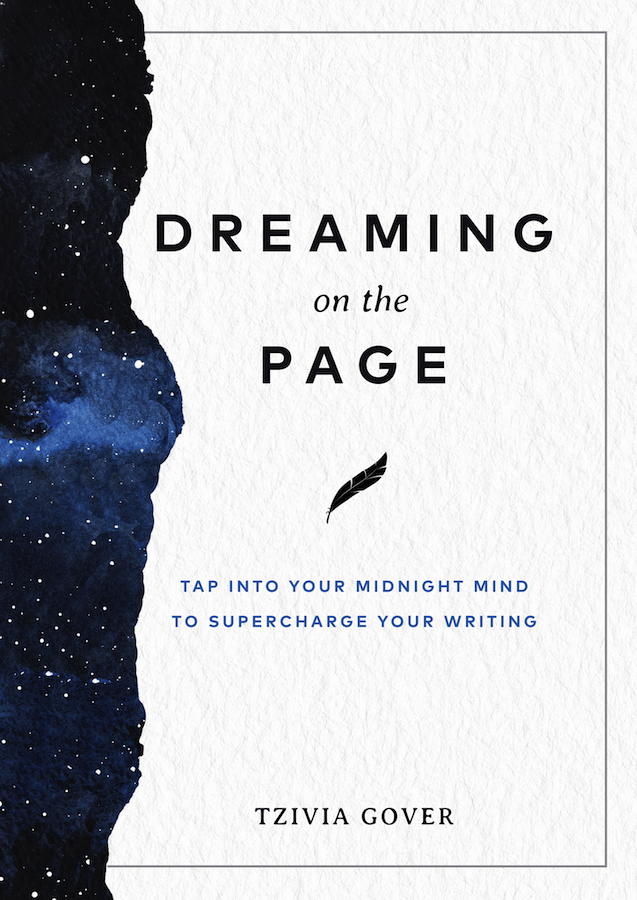
Today’s post is by Tzivia Gover, author of Dreaming on the Page.
Journals, like dreams, are the unsung heroes of the literary world. Countless works have been inspired by both and represent great repositories of raw material for books, poems, movies, plays, songs, and more. Each of my published books was birthed from the pages of my notebooks and is peppered with snippets of dreams and morsels of dream wisdom.
Not all authors remember or rely on their dreams, but dreamers and journal-keepers are uniquely blessed as writers. We never have to contend with the blank page, because we can use our dreams as texts and lines from our journals as prompts. Like a pot of broth simmering on the stove, the contents of our journals nourish us and provide the basis for countless delicious creations.
But first: a case against journaling your dreams
Some days, recording dreams can feel as unnatural as saving nail clippings or strands of hair caught in your comb. Wouldn’t it be healthier to rinse dream residue away in the shower each morning rather than gather each one to preserve in notebooks that fill your already overstuffed closets or drawers?
I tend to revisit this question when packing to move, or when I need extra storage space for winter clothes and I’m confronted by the accretion of nearly a half century’s worth of journals. That’s when I begin to question the conventional wisdom about the importance of writing dreams down, and instead I begin compiling evidence against it:
- Dreams don’t need writing. Dreams were around long before the relatively recent technology of writing was even developed. So, clearly you don’t need to write down dreams to reap their benefits.
- Dreams resist writing. If you’ve ever opened a book within a dream, you’ve probably experienced the frustration of seeing words swim and squirm so you can’t make them out.
- Statistically speaking, the written word is rare in dreams. (Although writers’ dreams are often the exception to that rule.) In this way, at least, it seems dreams and writing don’t mix.
- Dreams seem to recoil at being preserved on the page; they flicker into consciousness, then dissolve swiftly into forgetfulness. Is stitching them to the page with pen and ink as misguided as trying to sew our shadow to the soles of our feet?
But there’s no use arguing, or trying to build a case, as to how this question will be decided. Each time I present this argument to myself or others, it is resolved in favor of journaling dreams. After all, it’s not writing dreams down that’s the problem. The problem as I see it is this: We’re told to keep notebooks, but we rarely learn how to use them to mine meaning from our dreams or to glean literary gems for our writing. To make our notebooks earn their place on our shelves, we can use them to convert our dreams and musings into poems and stories, and as places where we can reflect on our literary process.
Also, our journals, including the entries that slosh over the shoreline dividing day and night, are central to a way of life that can serve us well. They represent and facilitate our commitment to doing the inner work that allows us to show up more fully for life each day.
10 really good reasons to write down your dreams
1. Know thyself. Journaling dreams helps you better understand yourself from the inside out, which in turn helps you understand your characters better, brings deeper empathy to your work, and makes you an all-around more interesting writer.
2. Write regularly—and better. Building the habit of writing dreams each morning is a great way to build writing into your everyday routine and improve your skills in the process.
3. Gain a wealth of material. As you record dreams in your journal, you are creating an encyclopedia of plots, landscapes, characters, themes, and ideas you can return to any time you need material for your poetry and prose.
4. Build a better relationship. Writing dreams regularly helps you become acquainted with the Scheherazade within who spins tales while you sleep. Becoming conscious of your nighttime narrator can make you a more confident storyteller and prime you to dream up new material by day, too.
5. Play with words. Freud memorably pointed out that dreams are masters of wordplay, including unpredictable puns, clever homonyms and homophones, and layers of meaning hidden just beneath the surface of words. Paying attention to dreams plugs you into these amusing and profound aspects of words that you can celebrate on the page as well.
6. Magnify the magic. Tracking dreams can reveal moments of magic (meaningful coincidences, precognition, and clairvoyance—to name a few) in what can otherwise be a writer’s relatively staid existence.
7. Stay calm and moodle on. Moodling is a word that’s so much fun to say that I’d love it no matter what it means. As it turns out, moodling is a term used by Brenda Ueland, author of If You Want to Write, to describe an activity that allows your mind to go slack and dissolve into the present-tense timeless moment. Gardening, doodling, rearranging the figurines on your shelves, listening to music, doing puzzles, and collaging are all ways to moodle. You can also add dream journaling to the list. This seemingly nonproductive time is essential to a productive writing practice.
8. Show what’s too beautiful to hide. In a letter to his brother, Vincent van Gogh described one reason he painted: “It is so beautiful, I must show you how it looks.” With just about anything else we do or witness during the day, others may have seen or overheard it, too. But the dream is ours and ours alone. Writing the dream is how we preserve it so we can learn from it, express it, or share the otherwise ephemeral experience.
9. Warm up. Starting your day with your dream journal and a mug of something delicious to drink is a wonderful way to check in with yourself and warm up to the page, too.
10. Keep your friends. When you gush to a friend, “I had the most amazing dream last night!” you may find that most people back up a few paces or suddenly remember an important appointment they need to rush off to. In addition to all of the above benefits of keeping a dream journal for writers, an added benefit is that the page is an eternally patient, listening ear. Tell your dreams to your journal—and save the highlights reel to share (sparingly) with your loved ones.

Tzivia Gover, founder of Dreaming on the Page classes and workshops, is the author of several books, including Dreaming on the Page and The Mindful Way to a Good Night’s Sleep. She teaches programs internationally, domestically, and online. She is also a Certified Dreamwork Professional and a Certified Proprioceptive Writing instructor. Gover has an MFA from Columbia University in creative nonfiction. She writes and dreams in western Massachusetts.


Wonderful post! I write a brief journal entry every morning that sometimes includes dreams. I also write a daily essay and some are based on the last dream I had before waking up–or the dream that wakes me up. If anything, keeping a writing journal–dreams or not–is a sneaky way of getting one into the daily writing habit.
That’s wonderful, Tim! A testimony to the power of journaling dreams and daily events. It’s a great practice for writers or anyone who wants to boost creativity or hone their literary skills!
I keep a daily journal (more like Morning Pages a la the amazing Julia Cameron) and I routinely write down my dreams. They often appear in subsequent writing. Big thumbs up on this post!
I am also a big fan of “The Artist’s Way!” And love knowing your dreams find a place in your morning pages and other writing. 🌈💫
Thank you for posting this! Dreams have enhanced my work as both a composer (classical music) and writer. Much of my musical material has come to me in dreams, and I have similarly been graced by plot lines and even actual text. I often dream in pure sound (i.e., music, without words), and I have also had the marvelous experience of dreaming in iambic pentameter (which led to my *Hamlet, Revisited* in *Two Oedipal Plays*).
If anyone needs convincing that paying attention to dreams is worthwhile, your comment surely provides all they need to know. It sounds like you have an amazing relationship with your dreams. Wonderful!
Tzivia, what a delightful surprise to find you on Jane Friedman’s blog page!!! Love this list too.
Ha! Fun to see you here, too. Thank you, Stephanie 🙂